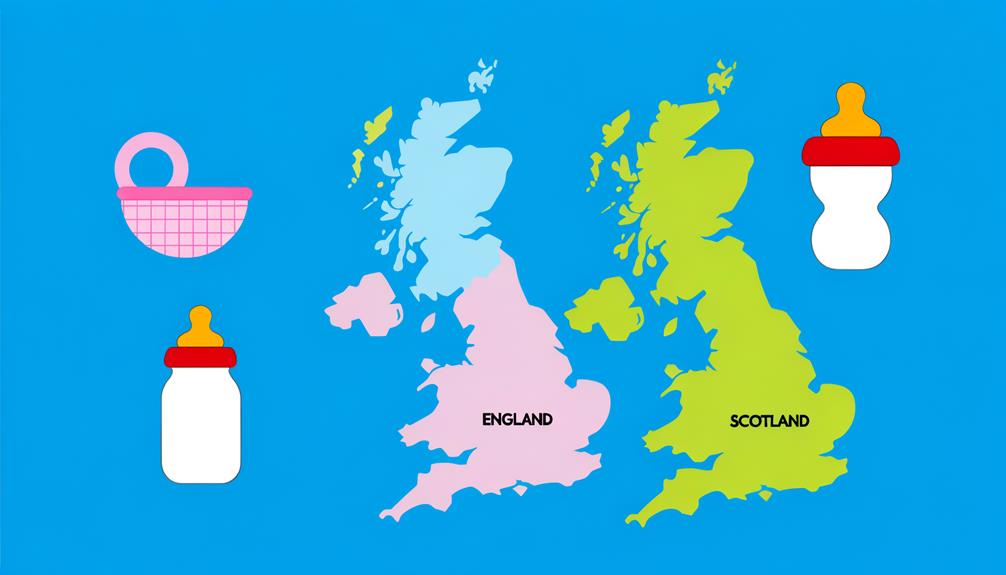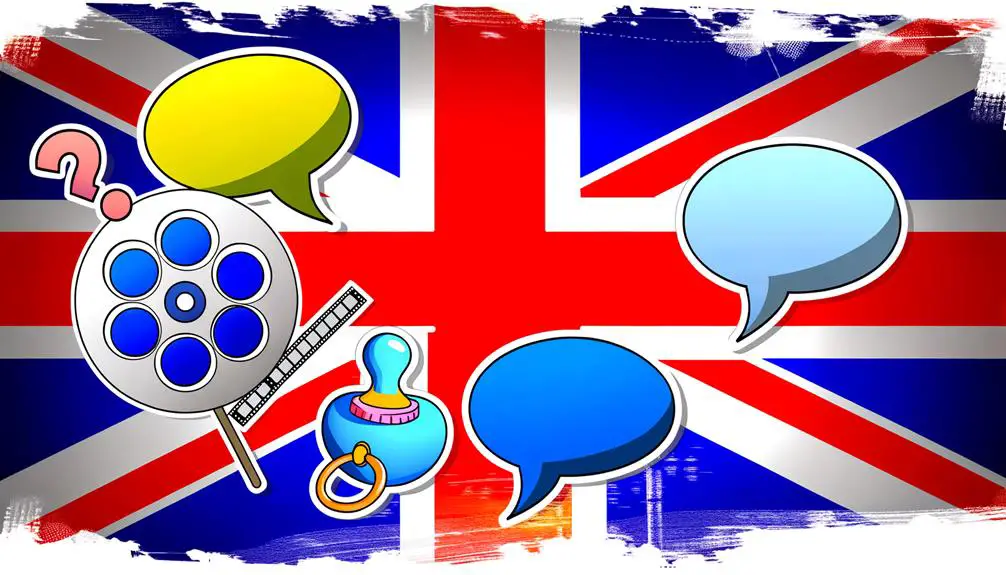In British slang, "dummy" carries several meanings. Initially, it described a silent person or object, reflecting societal views on communication. Today, you'll most commonly hear it referring to an infant's pacifier, highlighting its role in teething, emotional support, and oral development. Additionally, it's transformed to signal an ignorant person, embedding emotions like frustration. In social contexts, "dummy" denotes disbelief, layered with irony and skepticism. This term's versatility in the UK, influenced by regional dialects, showcases linguistic adaptability. Understanding its evolution and varied uses offers insight into British culture and social nuances, inviting further exploration into its linguistic landscape.
Key Takeaways
- In British slang, 'dummy' commonly refers to a pacifier used by infants.
- It is also used to insult someone by implying they are ignorant or foolish.
- 'Dummy' can express disbelief or skepticism in social interactions.
- The meaning of 'dummy' varies across the UK due to regional slang differences.
- Its usage reflects linguistic dexterity and can convey emphasis, sarcasm, or soften critique.
Origins of 'Dummy'

The term 'dummy' has its origins steeped in historical linguistics, tracing back to the early 19th century when it first appeared in British English to denote a silent person or object. This etymology exploration reveals the word's shift from a descriptor of muteness to its broader applications, embodying the linguistic evolution that characterizes the fluidity of language. Initially, 'dummy' might have served as a colloquialism or slang, but its incorporation into formal language underscores the dynamic nature of linguistic adaptation.
As you investigate deeper into the historical context, you'll find that 'dummy' reflects societal attitudes towards silence and communication. The term's evolution mirrors changes in social norms and cultural values, illustrating how language evolves in response to shifting paradigms. This linguistic journey from a specific, literal meaning to a spectrum of figurative applications highlights the role of language in mirroring societal progress.
Understanding the origins of 'dummy' through etymology exploration offers insights into the processes of linguistic evolution. It's a sign of how words can grow, adapt, and acquire new meanings over time, influenced by cultural, social, and historical factors.
Common Meanings
You'll find that 'dummy' encapsulates a range of meanings, from a tool of comfort for infants to a pejorative term denoting ignorance. Each usage reflects different facets of societal attitudes and linguistic evolution. Analyzing these meanings provides insight into how language mirrors cultural and social shifts.
Pacifier: Infants Comfort
Why is it that in British English, 'dummy' commonly refers to an infant's pacifier, a device designed for comfort and soothing? This terminology not only captures the essence of the object but also its functional role in child care. A pacifier, or dummy, serves multiple purposes:
- It acts as a teething aid, providing relief to infants during the painful teething process.
- As a soothing technique, it helps calm babies, aiding in sleep and reducing crying.
- It supports oral development, preparing infants for natural feeding habits.
- The dummy offers emotional comfort, simulating the calming effect of breastfeeding.
Understanding the pacifier's multifaceted role highlights why 'dummy' is more than just a colloquial term; it's a nod to the object's integral part in nurturing and comforting infants.
Ignorant Person Insult
Shifting focus to another interpretation of 'dummy,' it's intriguing to note how the term morphs when applied to describe an ignorant person, reflecting societal attitudes and linguistic evolution. This usage, emblematic of modern insults, underscores a disparagement that aligns with evolving societal attitudes towards knowledge and awareness.
| Emotion Elicited | Societal Reflection |
|---|---|
| Frustration | Intolerance of ignorance |
| Disappointment | Expectation of informed discourse |
| Anger | Reaction to perceived willful ignorance |
| Sadness | Regret over lost potential for understanding |
| Contempt | Disdain for unenlightened viewpoints |
This analysis reveals a complex interplay between language, emotion, and societal expectations, highlighting how the term 'dummy' as an insult encapsulates contemporary discomfort with ignorance.
Expression of Disbelief
Analyzing the term 'dummy' as an expression of disbelief, we observe a nuanced linguistic reflection of skepticism and astonishment in social interactions. When you hear it used in this situation, it's often to underscore a moment of incredulity, where the surprise factor and skepticism expression converge to highlight the speaker's doubt. Consider these aspects:
- The term encapsulates a moment of questioning reality, where common sense seems suspended.
- It underscores the speaker's immediate reaction to an unexpected or seemingly absurd situation.
- The use of 'dummy' in disbelief often carries a tone of ironic humor, adding a layer of complexity to the interaction.
- It reflects a spontaneous skepticism expression, where the surprise factor is a pivotal element in the communication process.
Essentially, 'dummy' as an expression of disbelief serves as a mirror to the dynamics of human astonishment and skepticism.
Usage in Context
Understanding the contexts in which 'dummy' is utilized will illuminate its multifaceted significance in British vernacular. The term finds its roots deeply embedded in various aspects of communication, serving not just as a placeholder but as a strategic element in dialogue. When you explore the applications of dummy techniques, you're basically unpacking a toolkit employed for emphasis, sarcasm, or to soften the blow of a critique. A conversational dummy, for instance, might be used to fill a gap in dialogue or to tactfully steer a conversation without the direct imposition of opinion or direction.
This deliberate employment of 'dummy' within the framework of British conversation reveals a layer of linguistic dexterity. It's not merely a word but a device that, when used with precision, can alter the trajectory of an interaction. Analyzing its use, you'll find that it serves to navigate social nuances, allowing speakers to maintain harmony or assert dominance subtly. The term embodies a complexity that transcends its apparent simplicity, encapsulating the essence of British communication ethos: indirect, understated, yet profoundly impactful.
Variations Across the UK

You'll find that the British slang word 'dummy' does not carry a consistent meaning throughout the UK, a fact attributed to regional slang differences. Local interpretations of 'dummy' can vary greatly, reflecting the diverse linguistic landscape of the region. This variation underscores the cultural influence on its meaning, suggesting a rich tapestry of local identities and expressions within British society.
Regional Slang Differences
While the term 'dummy' commonly refers to a pacifier in much of the UK, regional variations in slang reveal a rich tapestry of linguistic diversity across the country. The influence of local dialects on slang terms, including 'dummy', underscores the complexity of British linguistic diversity. Consider how regional slang differences manifest:
- Dialect Influence: Variations are often rooted in historical dialects.
- Linguistic Diversity: Each region's unique linguistic identity contributes to slang differences.
- Cultural Identity: Slang can reflect local culture and attitudes.
- Geographical Separation: Physical distance between regions fosters linguistic variation.
Understanding these factors helps you appreciate the nuanced landscape of British slang, highlighting how regional differences enrich the language.
Local Dummy Interpretations
Exploring the variations of the term 'dummy' across the UK, it is crucial to acknowledge that each region's interpretation not only reflects its unique linguistic footprint but also its cultural nuances and historical dialect influences. The discussion surrounding 'dummy signals' and the 'mimicry debate' illustrates the complexity and depth of these local interpretations. In some areas, 'dummy' may refer to deceptive or misleading actions, aligning with the concept of dummy signals in communication theory—actions intended to mislead or confuse. Meanwhile, the mimicry debate introduces another layer, suggesting that 'dummy' can denote imitation or replication, often with a negative connotation. This multifaceted analysis reveals that understanding 'dummy' requires a nuanced appreciation of regional linguistic idiosyncrasies, far beyond a superficial grasp of British slang.
Cultural Influence on Meaning
Building on the understanding of regional nuances in the term 'dummy,' let's explore how cultural factors across the UK shape its meaning. Language evolution and societal attitudes play significant roles in this process, leading to a rich tapestry of interpretations.
- Language Evolution: As languages blend across regions, 'dummy' adopts new meanings, reflecting local vernaculars.
- Societal Attitudes: The term's connotation can shift based on prevailing societal views, including stereotypes or regional pride.
- Cultural Significance: In some areas, 'dummy' carries historical or cultural weight, influencing its interpretation.
- Media Influence: Exposure to different UK media forms can standardize or diversify the term's usage, impacting its regional meanings.
Understanding these factors offers insight into the complex landscape of British slang and its regional variations.
Popular Culture References

In popular culture, the British slang word 'dummy' frequently appears, offering insights into the nuances of UK vernacular and its impact on global audiences. Celebrity usage of 'dummy' in interviews and social media has played a pivotal role in its dissemination beyond the UK, providing a lens through which the global audience gains exposure to British colloquialisms. Music lyrics are another critical arena where 'dummy' finds resonance. British musicians, leveraging their international platforms, incorporate 'dummy' into their lyrics, contributing to a cross-cultural exchange of slang. This not only enriches the global music landscape but also invites listeners to explore the depth of British street language.
Analyzing the trajectory of 'dummy' within popular culture reveals a pattern of linguistic migration, where a term rooted in the specificity of British culture attains a form of universality through media consumption. The scholarly examination of this phenomenon underscores the power of popular culture in shaping language and facilitating dialogues across diverse linguistic communities. Through celebrity endorsements and creative expressions in music, 'dummy' transcends its local origins, inviting a global audience to partake in the richness of British linguistic identity.
Misinterpretations Abroad
Despite its widespread popularity within the UK, 'dummy' often encounters misinterpretations when it crosses into international contexts, leading to nuanced challenges in global communication. This phenomenon underscores the complexities inherent in language evolution and cultural exchange. As you navigate these linguistic waters, consider the following:
- Cultural Context: Without understanding the cultural significance of 'dummy' in the UK, non-native speakers might misinterpret its meaning, attributing it to laziness or ignorance rather than its intended reference to a pacifier or a person acting foolishly.
- Colloquial Use: The casual nature of slang can lead to confusion, especially in formal or professional settings where the term's informal connotations are out of place.
- Evolution of Language: As languages evolve, the meanings of words can shift. What 'dummy' means today might not align with its future interpretations or past usage, complicating cross-generational and cross-cultural communication.
- Translation Challenges: Direct translation of 'dummy' into another language might not convey the intended meaning, leading to misunderstandings unless the translator is familiar with both the linguistic and cultural nuances.
Understanding these challenges is essential for fostering effective international communication and appreciating the dynamic nature of language and cultural exchange.
Learning to Use Dummy

Having explored the complexities of international interpretations of 'dummy', it's now important to focus on how one can adeptly learn to use this term within its proper British context. The term 'dummy', mainly used in the UK, refers to what is known in other English-speaking countries as a pacifier or soother, particularly in a childcare context. Its correct application and the nuances surrounding it are vital for effective communication, especially among parents, caregivers, and healthcare professionals.
To integrate the term 'dummy' seamlessly into your vocabulary, an understanding of its practical implications, including dummy care tips and potential dummy attachment issues, is essential. The following table presents a concise overview:
| Aspect | Consideration |
|---|---|
| Dummy Care Tips | Ensure regular sterilization and inspect for wear and tear |
| Dummy Attachment Issues | Monitor for signs of excessive dependency and adjust usage accordingly |
Adopting this term requires a delicate balance between practical use and awareness of its impact on child development. Being mindful of these considerations ensures that your application of 'dummy' is both accurate and beneficial, reflecting a deep respect for its cultural and practical significance.







